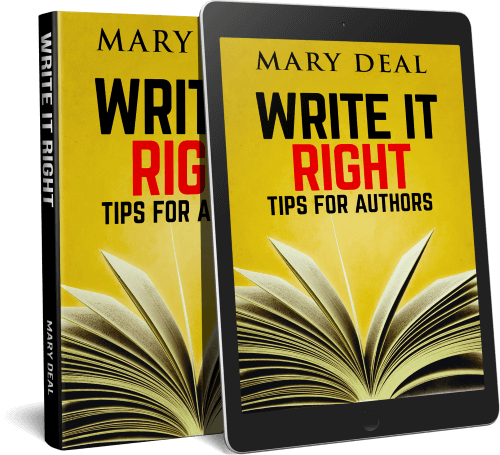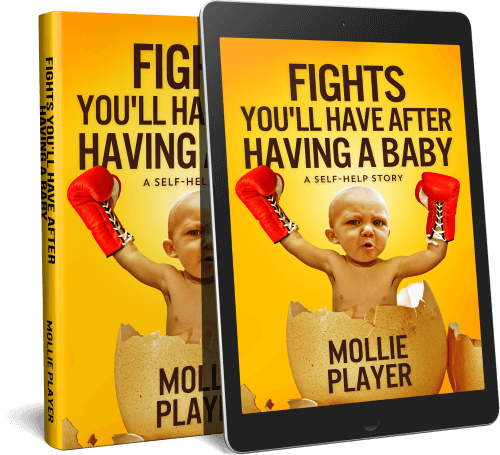Write It Right
Book excerpt
The First Time Writer
Some people seem unable to get a first story started no matter how many exciting plots they have rattling around in the attic. The advice given in some articles is meant to motivate would-be authors to begin. That same advice is sought by those already established in their careers and wishing to improve their talents.
You will....
~ have a story when you begin and be able to finish writing it.
~ develop your voice after you begin to write.
~ thoroughly understand character development when you realize how much fun it is to create story people.
~ learn all aspects of building a story. It happens naturally as you recognize your need to know more about composition.
~ learn to edit your work to perfection and will realize that the editing process begins from the moment you start to formulate sentences, paragraphs and then chapters.
~ discover ways to polish your prose and make it uniquely yours.
~ learn how to promote yourself even if thinking yourself a wallflower.
However, none of this can happen unless you reach the point of starting that first story. I would love to hear success stories from anyone who was helped by the advice in this book. I would wish everyone luck, but it’s not a matter of luck. It’s a matter of letting go of all the reasons for not writing and then getting started. It’s as simple as that.
Basic Reference Library
Serious writers have books and publications to which they refer. In my own reference library, I have had nearly 200 books but whittled it down to about thirty. Some books I purchased new; others I unashamedly scoured amazon.com, garage sales, flea markets, CraigsList, eBay and other sources to find what I wanted at a reasonable price.
Some reference books are now in eBook format. You can also find many printed on the Net and simply bookmark them for later reference.
The following is a brief list of only a few of my books and ones I would recommend every writer have in addition to their personal favorites:
Dictionary – an updated, thick, thorough one
Thesaurus – the biggest and best you can find
Chicago Manual of Style – University of Chicago Press – These are the rules that govern not only the writing industry but all of grammar usage, and some rules change from time to time.
Taber’s Cyclopedic Medical Dictionary – These are updated periodically. When writing about medicine or health, you’ll need to keep your medical and anatomical facts correct.
Self-Editing for Fiction Writers-How to Edit Yourself into Print – by Dave King and Renni Browne, Harper-Collins
Elements of Style – by William Strunk, Macmillian
Elements of Grammar – by Margaret Shertzer, Macmillian
Also handy to have are character naming sourcebooks. You can find names by searching on the Net by country, nationality, or culture. In my thriller, The Howling Cliffs – Sara Mason Mysteries Book Two, it was imperative that I had the names of the Vietnamese Hmong characters spelled correctly and named for the parts they played in the story.
Character Naming Sourcebook – Sherrilyn Kenyon, writersdigestshop.com. This thick volume separates names by nationality and culture and also gives their meanings.
Multicultural Baby Names – MJ Abadie, Longmeadow. Although I have this book, you can also do a Net search for new baby and children’s names to keep up with what’s popular as trends change and depending on the time period of your story.
50001 Best Baby Names – by Diane Stafford, Sourcebooks, Inc.
Mystery and crime writers should have some police procedural books handy, or pay attention to the jargon and colloquialisms you hear officers using on TV shows. Here are two good ones that are updated periodically.
Police Procedural – Russell Bintliff, Writer’s Digest Books
Cop Speak: The Lingo of Law Enforcement and Crime – Tom Philbin, John Wiley & Sons, Inc.
When you include foreign characters, their language, accents and brogue should also be accurate. Books are available quoting language nuances from different countries. Two such:
NTC’s Dictionary of British Slang and Colloquialisms – Ewart James, NTC Publishing Group
SLANG: The Authoritative Topic-by-Topic Dictionary of American Lingoes from All Walks of Life – Paul Dickson, Pocket Books
When you’re ready to publish, you should have some reference books that can both help you publish your work and manage publicity.
Let’s Get Digital: How to Self-Publish, and Why You Should (3rd Edition) – David Gaughran
1001 Ways to Market Your Books – John Kremer, Open Horizons – Meet this helpful expert on TheBookMarketingNetwork.com.
This list is meant to help you build a usable library. I highly recommend the first five no matter what else you add to your collection or decide to pass over. Remember, too, to keep your information updated, no matter the source.
Nonfiction writers have certain books and instructions they follow. Too, screenplays, have a whole list of aids for that genre. Some information for these are included here but we’ll be publishing more in the next volume when it is completed.
A File of Notes
Every time a writer gets an idea, an intense plot line, a shocking sentence, a joke, it should be jotted down. Those that are hand written should soon be entered with the rest into a file of notes in a word processor. Before walking away from that note, make sure you have captured it properly in words, so the original mood or thought is clearly expressed.
Nothing is worse than to look back at your entries, searching for something you know you logged, and not understand what you wrote. Or perhaps what you wrote in haste doesn’t trigger the original excitement. You may not know into which story any of the notes fit, but they are just too good a thought or idea and should be captured, given life, and not left to recall later when the original creativity and memory has faded.
Into that file of notes goes everything that you cannot presently use. Character sketches, humor, plot ideas, beginnings, endings, titles, something someone said. You name it. From this file of notes is where you will draw many tidbits to enhance your stories, present or future, especially when your muse takes unannounced time off.
Very often with me, a certain entry will stand out in my mind and my muse will play with it, that is, enlarge the idea, and make something happen with it. At that point I usually know into which story the material can be applied. Should I not know where it belongs, I simply record the new information expanding the first idea and then leave it alone.
I have gone back to my notes for each and every novel or short story that I write. In the case of making notations of funny lines and crazy quips, when I have a particular character with an off-the-wall personality, I know exactly which lines I can pull from the notes and incorporate into my story.
The importance of note making can’t be stressed enough; hence, the use of the proverbial paper table napkin, ala JK Rowling and Ernest Hemingway before her.
9 Tips for Beginners
Tip #1 – Store Some Writing Tips
Usually when I see great writing tips, I have a file set up in Word called - what else? Writing Tips. I copy and paste the advice into my file to refer to when needed. Included is the name of the author of the tidbit, in case I wish to quote them at some future time. Any handwritten notes I’ve made as reminders also get transcribed and posted there.
Simply for clarification: When quoting another person’s writing or spoken word, up to only 100 words may be used and the originator of the piece must be given credit.
Tip #2 – Be Prepared to Write
Keep writing materials handy no matter where you go. That one stunning idea you forgot to write down but were sure you’d remember, and then forgot completely, could have been the one fragment that made your story memorable.
We writers should make notes everywhere we go. If without a laptop, we carry note pads and pens. JK Rowling used paper table napkins because she used to sit in her favorite cafe lamenting her jobless plight - till a shift happened in her mind and she started penning the notes for her first novel.
Ernest Hemingway wrote on table napkins when sitting in one of his two favorite bars in Cuba, El Floridita and La Bodequita del Medio.
Tip #3 - Beginnings
Avoid using empty words to start a story. Some empty words are:
There - refers to a place
They - refers to people
That - refers to a thing
It - refers to almost anything
Without first knowing the content of your story, we have no idea to what each refers. For example, one person may write:
There were four of them.
Without yet knowing the story, ask yourself: There? Where were they? Who were they? A better way to bring the action forward would be to say,
Four of them appeared.
Or get directly into the meat of your story and say:
Four men dressed in black mysteriously appeared out of nowhere.
You can write much more succinctly when using descriptive words, and not empty ones to start a story or sentence or paragraph.
Exceptions are:
The Charles Dickens line: It was the best of times. It was the worst of times. I see no way to improve on that – or emulate it. that’s because It refers is clarified right there in each sentence: ...best of times. ... worst of times.
Also: It was a dark and stormy night, coined by the Victorian writer, Edward Bulwer-Lytton in his 1830 novel Paul Clifford. Surely, you wouldn’t write: A dark and stormy night had overtaken us. Or would you?
Sentences beginning with It, especially beginning entire books, had their places in yesteryear’s prose. Such lackadaisical nondescript expressions are not acceptable in the descriptive writing demanded of these modern times.
Learn more about the importance of correct word usage in the Nuts and Bolts section of this volume.















Praesent id libero id metus varius consectetur ac eget diam. Nulla felis nunc, consequat laoreet lacus id.